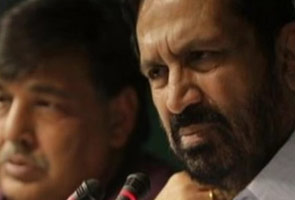
Sports Minister Ajay Maken attempted to explain in the Lok Sabha just how Mr Kalmadi ended up as the man in charge of organizing the Commonwealth Games in Delhi in September 2010. (Read: Maken's statement in Lok Sabha on Kalmadi controversy)
Mr Kalmadi was arrested in April for corrupt practices. But for months before that, India had been exposed to the bare-faced corruption of Mr Kalmadi and his associates.
Mr Maken repeated what the Prime Minister's Office has been claiming - that Mr Kalmadi's appointment as Chairman of the Organizing Committee was a decision taken by the Atal Behari Vajpayee government that was in power when India bid for the Games in 2003.
The Whose Kalmadi Is He Anyway line of explanation has become critical because the government's auditor has, in a report, faulted the Prime Minister's Office for selecting Mr Kalmadi as Chairman of the Organizing Committee (OC). "In our opinion, the decision of the PMO for appointing Suresh Kalmadi as Chairman of the OC facilitated the conversion of the originally envisaged government-owned OC into a body effectively outside the government control," writes the Comptroller and Auditor General. The report will be presented soon in Parliament.
After NDTV reported on the controversial report last night, the Prime Minister's Office passed the buck quickly to the government headed by Atal Behari Vajpayee. When Mr Vajpayee was in power in May 2003, India bid for the Commonwealth Games. The UPA government says that when it was voted into power in 2004, it inherited a contract signed between India and the parent-body of the Games, the CGF, that agreed that the man who headed the Committee would be the President of the Indian Olympic Association (IOA) - a post then occupied by Mr Kalmadi.
Mr Maken told NDTV today that India's original bid submitted in May 2003 said a government nominee would be head of the Organizing Committee. But in November that year, the contract that India signed for the Games said that the organization of the Games would be entrusted to the Commonwealth Games Association of the host country, in this case the Indian Olympic Association.
Mr Maken claims that this contract signed by Mr Vajpayee's government, referred to as "the host-city contract" with the international parent body of the Games should have been signed by the government of Delhi, since it was the host city. But because Mr Vajpayee's government signed off on it, Mr Maken says, "The Host City Contract effectively became the "Host Country Contract". In the process, while it committed the Central Government to all financial and infrastructural obligations ...it, in one stroke also took away from the Government of India, any residual, amending or discretionary powers, that could have been exercised in emergent situations to salvage any wrong doings."
On November 1, 2004, the General Assembly of the Indian Olympic Association elected Mr Kalmadi the Chair of the Organizing Committee. Mr Maken said that many opposition parties were represented at the General Assembly, and therefore went along with Mr Kamadi's selection.
.
Incorrect, says the BJP. Vikram Verma was Sports Minister in 2003 in Mr Vajpayee's government when it bid for the Games. Mr Verma says the bid documents clearly listed that a government nominee would Chair the Organizing Committee; the President of the Indian Olympic Association would serve as Vice-President.
So how exactly did Mr Kalmadi get the much-coveted Chairman post? Even today, India's bid documents on the official Games site show Mr Kalmadi as Vice-Chairman. The government's auditor, the Comptroller and Auditor General states, "In our opinion the primary objective of the document titled as the 'updated bid' was to orchestrate the appointment of the president of the IOA, Suresh Kalmadi, as the chairman of the OC executive board; since as per the May 2003 bid document, the President of the IOA would only be the Vice Chairman."
As the UPA tries to deflect the blame, there appears to be several holes in its explanation. For example, a Group of Ministers met in October 2004 and decided Sunil Dutt, who was Sports Minister at the time, would head the Organizing Committee. This decision was reversed within days in favour of Mr Kalmadi. An upset Mr Dutt wrote to the Prime Minister to officially protest. In December, however, the Prime Minister's Office ratified Kalmadi's chairmanship.
The UPA has also been left somewhat exposed by letters written to the Prime Minister's Office by Mani Shankar Aiyer, who replaced Mr Dutt as Sports Minister. In 2007, Mr Aiyar warned that under Mr Kalmadi's stewardship, the Organizing Committee was indulging in financial malpractices. There was no action taken.
Guided by Mr Kalmadi, the Organising Committee seemed to treat the Commonwealth Games as some sort of personal fiefdom, awarding contracts for equipment and services to companies who quoted the most expensive rates.
No comments:
Post a Comment